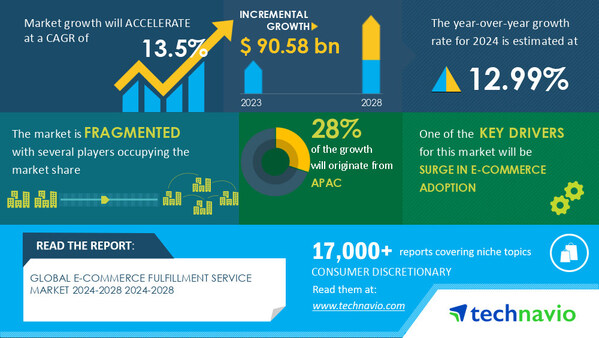NEWS PROVIDED BYTechnavio
May 14, 2024, 06:13 ET
NEW YORK, May 14, 2024 /PRNewswire/ — The global ecommerce fulfillment service market size is estimated to grow by USD 90.58 billion from 2024-2028, according to Technavio. The market is estimated to grow at a CAGR of 13.5% during the forecast period.
For more insights on the forecast market size and historic data (2018 – 2022) – Download Free sample report in a minutes

| Forecast period | 2024-2028 |
| Base Year | 2023 |
| Historic Data | 2018 – 2022 |
| Segment Covered | Service (Shipping fulfillment services, Warehousing and storage fulfillment services, Bundling fulfillment services, and Others ), Retail Channel (B2B and B2C ), and Geography (APAC, North America, Europe, Middle East and Africa, and South America) |
| Region Covered | APAC, North America, Europe, Middle East and Africa, and South America |
| Key companies profiled | Amazon.com Inc., Boxzooka, Deutsche Post AG, eFulfillment Service Inc., FedEx Corp., Flexe Inc., Rakuten Group Inc., Red Stag Fulfillment, Ryder System Inc., SEKO Logistics, Shipbob Inc., Shipfusion Inc., ShipMonk, Shopify Inc., SNCF Group, Sprocket Express, STORD INC., United Parcel Service Inc., Xpert Fulfillment, and XPO Inc. |
Key Market Trends Fueling Growth
The e-commerce fulfillment market is experiencing significant change due to technological innovations. Key trends include automation and robotics in warehouses for tasks like picking, packing, and sorting, reducing labor costs and enhancing efficiency. AI optimizes inventory management, route planning, and delivery schedules, resulting in faster deliveries and improved customer experience. Big data analytics provides valuable insights for warehouse location, resource allocation, and customer experience decisions. Additionally, value-added services, urgent delivery options, and e-commerce companies benefit from optimization solutions, machine learning, and AI. Lockdown restrictions and social distancing have increased the importance of e-commerce, particularly in urban areas, leading to increased demand for fulfillment services in sectors like beauty & personal care, healthcare, clothing & footwear, sports & leisure, and emerging economies. Investors, investment bankers, and venture capitalists are keenly interested in this sector, which relies on third-party knowledge providers, transport infrastructure, and efficient logistics and transportation services. Fulfillment service centers, online merchants, and return management are also crucial components of the e-commerce ecosystem. Urgent parcel services and inventory management are essential for addressing supply chain disruptions, labor shortages, and other challenges.
Market Challenges
- The ecommerce fulfillment service market faces intricate logistical challenges, including managing inventory levels in multiple warehouses, addressing labor shortages and rising wages, and integrating diverse systems. Key components include shipping services, automated robots, e-fulfillment platforms, online marketplaces, and various logistics partners. Consumers’ demands for fast, transparent delivery push innovation in areas like mobile applications, smartphone commerce, and automation. Market opportunities arise from trade liberalization policies, cross-border shipping agreements, and intellectual property rights, while regulatory frameworks in countries like Japan shape the landscape with laws like the Pharmaceutical Affairs Law and Food Sanitation Law.
Research report provides comprehensive data on impact of trend, driver and challenges – Buy Report
Segment Overview
This ecommerce fulfillment service market report extensively covers market segmentation by
- Service
- 1.1 Shipping fulfillment services
- 1.2 Warehousing and storage fulfillment services
- 1.3 Bundling fulfillment services
- 1.4 Others
- Retail Channel
- 2.1 B2B
- 2.2 B2C
- Geography
- 3.1 APAC
- 3.2 North America
- 3.3 Europe
- 3.4 Middle East and Africa
- 3.5 South America
1.1 Shipping fulfillment services- The e-commerce industry’s reliance on shipping fulfillment services continues to grow, with automation and cutting-edge technologies playing a pivotal role. Companies like Red Stag Fulfillment offer extensive service portfolios, including inventory management, order processing, and last-mile delivery. Automated robots and mobile devices, such as smartphones and tablets, streamline the fulfillment process, enabling real-time order tracking and management. E-commerce revenue from online retailing services, including sales of products like televisions, clothing and footwear, consumer electronics, and more, is driven by efficient and timely doorstep deliveries. Market opportunities abound, with the increasing use of mobile commerce, online marketplaces, social media platforms, and subscription services. The Japanese government’s Pharmaceutical Affairs Law and Food Sanitation Law have opened up new markets for fulfillment services, particularly in the pharmaceutical and food industries. Market participants can benefit from trade liberalization policies, cross-border shipping agreements, and intellectual property rights protection. Fulfillment services centers are expanding their warehousing capabilities to meet the demand for products and improve fulfillment productivity and order delivery times. Mobile applications and online stores are revolutionizing the way consumers shop and receive their purchases, making the fulfillment process more convenient and efficient than ever before. Overall sales are expected to continue growing, driven by the movement of people and economic cooperation between countries.
For more information on market segmentation with geographical analysis including forecast (2024-2028) and historic data (2018 – 2022) – Download a Sample Report
Research Analysis
In the dynamic landscape of electronic commerce, fulfillment service providers play a pivotal role in catering to the needs of online buyers in emerging economies. These centers offer essential services such as warehousing, return management, and urgent parcel delivery, enabling online merchants to optimize their inventory and shipping processes. The internet has revolutionized retailing services, leading to an increase in e-commerce revenue and the proliferation of online shopping. Smartphones have further fueled this trend, allowing consumers to make purchases from anywhere at any time. Amidst lockdown restrictions and social distancing norms, e-commerce companies have relied heavily on logistics and urgent delivery services to ensure doorstep deliveries. Machine learning and artificial intelligence (AI) have been instrumental in optimizing fulfillment operations, enhancing efficiency and accuracy.
Market Research Overview
The Ecommerce Fulfillment Service Market plays a crucial role in the seamless delivery of online purchases to consumers. This market comprises various entities that manage and execute the process of picking, packing, and shipping products to customers on behalf of e-commerce businesses. The use of advanced technologies such as automation, robotics, and artificial intelligence enhances the efficiency and accuracy of fulfillment services. The on-demand nature of e-commerce necessitates quick turnaround times, making it essential for fulfillment centers to have a large inventory capacity and efficient order management systems. The market for e-commerce fulfillment services is highly competitive, with numerous players offering various value-added services such as branded packaging, kitting, and dropshipping. The integration of these services with e-commerce platforms and marketplaces enables businesses to offer a superior shopping experience to their customers. The e-commerce fulfillment service market is expected to grow significantly due to the increasing popularity of online shopping and the need for businesses to offer fast and reliable delivery options.
Table of Contents:
1 Executive Summary
2 Market Landscape
3 Market Sizing
4 Historic Market Size
5 Five Forces Analysis
6 Market Segmentation
- Service
- Shipping Fulfillment Services
- Warehousing And Storage Fulfillment Services
- Bundling Fulfillment Services
- Others
- Retail Channel
- B2B
- B2C
- Geography
- APAC
- North America
- Europe
- Middle East And Africa
- South America
7 Customer Landscape
8 Geographic Landscape
9 Drivers, Challenges, and Trends
10 Company Landscape
11 Company Analysis
12 Appendix
About Technavio
Technavio is a leading global technology research and advisory company. Their research and analysis focuses on emerging market trends and provides actionable insights to help businesses identify market opportunities and develop effective strategies to optimize their market positions.
With over 500 specialized analysts, Technavio’s report library consists of more than 17,000 reports and counting, covering 800 technologies, spanning across 50 countries. Their client base consists of enterprises of all sizes, including more than 100 Fortune 500 companies. This growing client base relies on Technavio’s comprehensive coverage, extensive research, and actionable market insights to identify opportunities in existing and potential markets and assess their competitive positions within changing market scenarios.
Contacts
Technavio Research
Jesse Maida
Media & Marketing Executive
US: +1 844 364 1100
UK: +44 203 893 3200
Email: media@technavio.com
Website: www.technavio.com/
SOURCE Technavio

